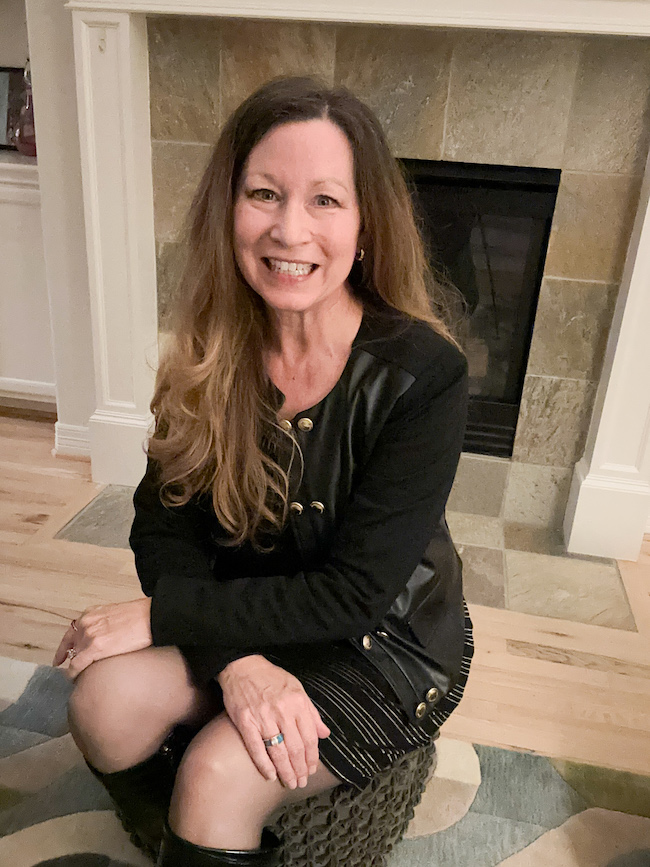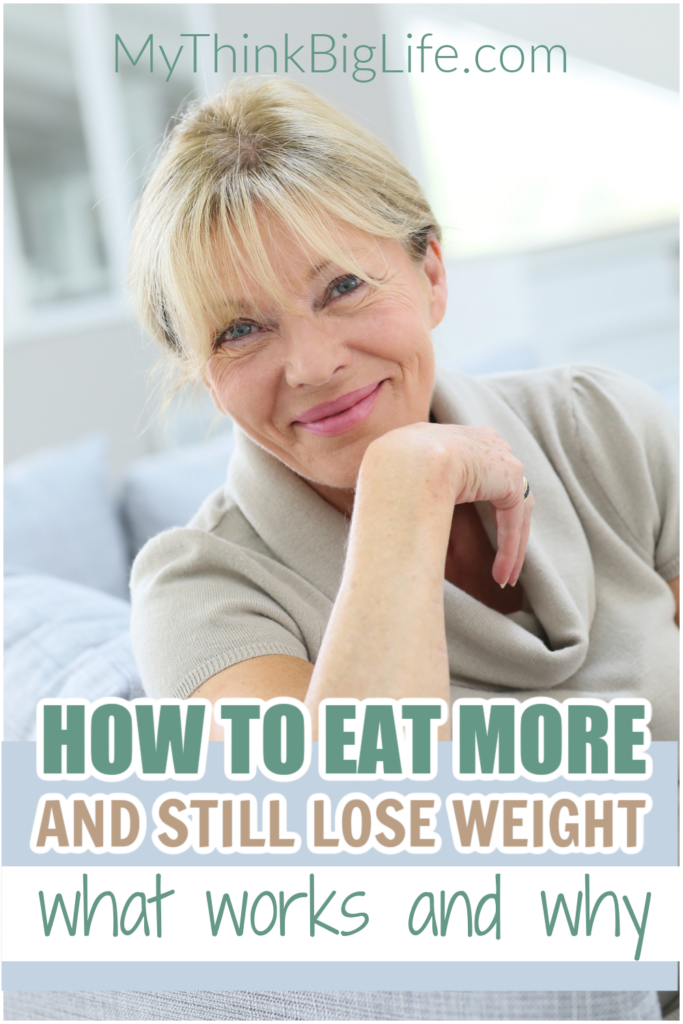How to Eat More and Lose Weight
Here’s something that might surprise you if you feel like you need to eat even less to loves weight. Most of my clients actually need to eat more to lose weight after 50 and 60.
What??? Don’t we have to eat less to lose weight?
That can work for a while but it’s usually no fun and usually backfires in different ways.
I’m going to do two things with this post. I’m going to demystify losing weight and I’m going to show you how you can actually eat more while you are losing weight.
I’ve always been a hearty eater and these are the things that have worked for me. At 61, I know how important nutrition is and through working with clients I know the struggles many women face.

No More Diet Confusion!
It might seem like there are millions of different diets out there. But all these diets mostly fall into three ways to lose weight. That’s it.
Most diets either focus on one of the three ways to lose weight or use some combination.
This is going to be helpful for you because you don’t need another diet. You just need to understand how diets work and choose the best options for your lifestyle.
Humans LOVE to make things complicated. Our brains really love to make things hard. But sometimes there really are simple answers.
Eating is one of those. It isn’t meant to be complicated. Despite being told to aim for a certain calorie intake or following more eating plans, you can take back control of your relationship with food.
Way back in the day—food, any food was good.
Then humans started growing and raising food.
Here in 2024, we’ve all lost our minds around food. What can I eat? What should I eat? How much should I eat?
In the latter part of the 20th century, fat was deemed bad and the low fat, high carb craziness began.
We know how that ended. More obesity and type-two diabetes. That wide-scale experiment did not go well for us.
Concurrent with that, fake foods were introduced and today, fake foods are the norm. Grocery stores have entire aisles devoted to sodas (pop for some of you), junk food, bread, and convenience foods.
Where once people only had to deal with finding some food to eat; now you navigate 60,000 different foods in a big grocery store!
With people gaining weight like crazy, the diet industry was born to help.
Yet, research shows that almost everyone (95%) who loses weight on a diet will gain it back.
And yet, we keep doing this crazy stuff over and over. I’m inviting you to get off this craziness!
Food really isn’t that hard. It’s managing your mind around food that can be more difficult.
Trying to lose weight by using willpower and restricting usually results in giving up and feeling worse. Cycling between starvation mode and overeating wrecks our metabolism.
Plus, by our fifties or sixties, we are so tired of diets, trying to lose weight, and seemingly getting nowhere. Many women find it impossible to find the motivation to even try again.
It’s so discouraging!

Why You May Need to Eat More to Lose Weight
I want to help you get off that cycle by using your mind and working effectively with your body.
More important than weight loss is feeling good, doing things you like, and loving yourself right now! That can all take place before you even lose a pound.
One thing I’ve noticed is that women will take something that they’ve heard works and then do it in an unhealthy way.
One example is intermittent fasting. When I refer to intermittent fasting, I am talking about the time from your last meal of one day until your fist meal of the next day. I aim for 12 hours to 15 hours. I sleep most of it.
But desperate women will turn this into one meal a day. 23 hours not eating and one hour eating. You cannot get enough nutrition this way.
Or they will do full day fasts more than once a week.
Another thing I see is doing something like going to a plant-based diet but still eating lots of sugar and other highly processed carbohydrates. (Eliminating good sources of proteins but keep the problem foods in their diet.
The third thing I see is not eating enough at meals because of too many snacks. Snacks are a problem even if they are healthy snacks.
Feeling out of control around food does not feel good. What does feel good is eating food you like, when you are hungry, and knowing you can have what you want without losing control.
My clients are always amazed when they just aren’t overeating or over snacking anymore.
Now lets talk about how we do lose weight.
The Ways People Lose Weight
The three main ways that a person can lose weight are:
- Restricting calories
- Restricting food groups. These days, it is mostly restricting carbohydrates.
- Restricting the timing of when you eat.
Restricting Calories
For a long time, we’ve been told if you ate fewer calories, you would lose weight. Often there are arbitrary daily amounts such as 1200 calories a day. Remember the old calorie deficit idea.
Simply counting and limiting calories can cause weight loss. But it can be very restrictive and depressing to not be able to eat enough to feel satiated.
That’s why everyone hates a diet while also feeling like we “should” be on one.
Calorie restriction can work for a time. But it is often difficult to sustain. For me the biggest problem is that to keep under a certain number of calories, you cut fat. And we need fat!
All calories are not created equal!
In the lab, yes, the way they measure this would indicate it doesn’t matter. A calorie is a measure of heat.
But in the body, there is a huge difference between how the body handles different kinds of food. 1000 calories of bread is going to have a different effect on your body compared to 1000 calories of protein.
Calorie restriction has other problems.
- When your calories are low, you may not be getting enough nutrition.
- Fat may be avoided to keep calories low, and fat is a nutrient that is essential for our bodies.
- Deprivation can also lead to overeating or binging later.
- Restricting calories doesn’t teach you to eat based on hunger and being full. (Who feels full on a diet?)
- When diets end, the majority of dieters gain the weight back.
The other thing I don’t like about having a set amount of calories every day is that it actually creates more obsession with food.
When I was on diets, I would be obsessed with each and every meal. I couldn’t enjoy life because I was always waiting for my next meal so I could eat again.
I looked at food as good (low calorie) or bad (high calorie).
The problem with that is some awesome foods are high calorie. Being low calorie doesn’t mean healthy or good.
I ate a lot of low-calorie things that were supposed to be a substitute for real food. But they never truly satisfied me.
A benefit of a higher calorie diet is that is can truly satisfy. You can actually lose weight eating more calories.
The following two ways to lose weight do allow you to eat more and keep your weight steady or to lose.
Restricting Carbohydrates
By now, most of you have heard about eating low carb or keto. The term low carb can be confusing. What does low carb even mean?
To be honest, I don’t count carbs. I stick to small portions with my meals and that seems to work.
When I overeat on processed foods or go out to eat too often, I start to gain weight. It happens pretty quick for me. My body does best on simple meals at home.
But hey, no one has to do that 100%.
To be clear, I am very supportive of being intentional about how many carbohydrates you eat. This consists of how much and what kind.
There are many carbohydrates. Some are vegetables and fruits. Bread, pasta, and sweets are carbs. Sugar is super concentrated carbs. Most junk food or fast food is high in carbs.
You can safely remove all sugar and junk food from your diet. You don’t need it physically, though you might be a little addicted to it.
You don’t have to go all low carb either. You can absolutely include carbohydrates in your diet.
To lose weight or maintain a weight, you do have to be intentional about carbohydrates. Our bodies can be sensitive. A little can make you feel great. Too many and you see weight creeping on.
The reason for this is because all carbohydrates will cause insulin to be released. By our fifties and beyond, many of us have some level of insulin resistance.
When you eat sugar or foods that act like sugar in your body, it causes a spike in the insulin released. If there is more sugar in your blood than the insulin can handle, the extra is stored as fat.
It is these types of food that cause fat to be stored. As the years go by, you can gain weight because of eating more carbohydrates than your body can handle.
And to make matters worse, your body is less efficient at handling sugar because of the chronic overeating of sugar and foods that act like sugar in your body.
When I talk about foods that act like sugar in your body, I’m mean things like bread, pasta, crackers, junk food, fast food, etc.
My personal rule of thumb for these types of food is to only have them once or twice a week.
However, I will have a starchy vegetable or fruit with most of my meals.
One of the most important mindset changes you can do is to stop thinking of these highly processed foods as nutrition.
The thing is that weight gain comes from hormones, not from eating fat. You can be a light eater but if you have insulin resistance you can gain weight.
All of my clients who mostly eliminate sugar, always tell me that they FEEL better. They have fewer body aches and often note increased energy.
We often think of sugar and processed foods as giving us energy but it’s really the opposite. While they cause our blood sugar to spike, the crash later can leave us feeling worse.
To transition to a diet that has fewer quick acting carbs, be sure and eat enough fat. This will make your food taste better and keep you satisfied for longer periods of time.
Restrict the Timing of Your Eating
This goes by two names: time restricted eating and intermittent fasting. This is helpful for more than weight loss.
Remember the insulin resistance that most of us have at this point in our lives. A period of fasting each day can help with that.
This is a great tool, and it doesn’t have to feel restrictive. The biggest part of this for some women is not eating after dinner.
If you don’t eat after dinner, it’s pretty easy to get a 12-hour fast in. That is my baseline and if I’m not hungry I’ll extend it to 13 – 15 hours.
Unless you have a medical reason to eat round the clock, this can be one of the most helpful things you can do. Combined with a moderate amount of carbs, this can be key to losing weight when nothing else has worked.
I discovered this by accident about seven years ago. With my children grown and living by myself, I wasn’t eating heavy in the evenings, and I would often start the day with coffee instead of breakfast.
I ended up losing about 25 pounds and a couple of sizes.
Prior to this, I was eating very clean and healthy, but I hadn’t lost any weight for almost a decade. So, for me, eating clean just didn’t result in weight loss. It wasn’t until I quit eating at night that I saw any weight loss.
For me, I always go 12 hours without any food. Then I just wait to eat until I feel hungry. That is usually in the 13–15 hour range.
I have a normal lunch and then later a normal dinner. Sometimes I will have a green smoothie or a light snack if I get hungry.
I think it works well because you are able to eat really satisfying meals and then you take your break from eating during a natural time that your body doesn’t really need food.
The only way to know what will work best for you is to experiment with this.
What you don’t have to do is go extremely low carb or to restrict your timing for too long.
Sometimes if you restrict too much you can actually gain weight!
Also, when I say wait to eat until you are hungry; it doesn’t mean you have to feel extremely uncomfortable.
Being hungry means that you’ll have some body sensations. You might feel a little empty or hollow. You might hear or feel some stomach grumbling.
These are the signs that it is time to eat!
I don’t recommend longer fasts. I see some professionals recommend longer fasts; for me that is too restrictive.
I will only do something that I am willing to do every day—and fasting for long periods is not one of those things.
We don’t want to exchange the misery of a calorie-restricted diet for one of not eating all day.
However, I see lots of value in not eating for a natural period of time, such as from dinner to your first meal of the next day.
How to Eat More and Lose Weight
To be able to eat more food and lose weight, cut out sugar and processed and junk foods. (for the most part) Then don’t eat or snack after dinner and have about 12 to 15 hours until your next meal.
Eat plenty of vegetables, healthy fats, and protein at each meal. Wait to eat until you are hungry and quit eating when you feel comfortable.
This isn’t a quick fix or something you do for a short time. This takes time to find out what works best for you and for you to get comfortable eating like this.
You won’t be hungry for food!
The reason women do come to me for coaching is that the food they are eating when they aren’t hungry is covering up for something. Most overeating is about providing some kind of comfort.
If food provides your comfort, it pays off to take your time making changes.
Always always, be kind to yourself!
Keep showing up my friends,
Sara
Ready to find out more?
Schedule a free consultation today.
Coach with Me!

Hi, I'm Sara Garska and I'm so happy you're here! Big changes can happen with a shift in thinking. Over time, you transform your life into the one you always dreamed of having. As a certified life and weight loss coach, I can help you create a life you love. Click here to schedule a free 50-minute coaching session.
